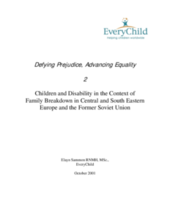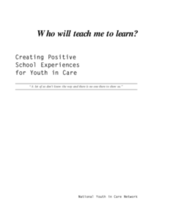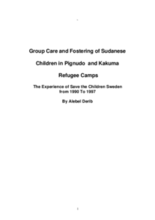Demographic Data:
|
Sources: World Bank, UNDP, DHS 2010-11 |
Displaying 14091 - 14100 of 14340
The purpose of this report is to document the levels of child abandonment and de-institutionalization as an indicator of the quality of social transformation during the transition decade (1990-2000).
A study on children with disabilities in the context of family breakdown. Includes overviews and statistics from 10 countries, a call for strengthened family support services, and draft guidelines on how child agencies can better mainstream these issues into their work.
A report recording the proceedings of a conference co-sponsored by the World Bank and World Vision. The two-day conference sought to promote awareness of OVC issues around the world, to provide practitioners with a forum to share best practices and other insights, and to probe the role of social protection in implementing a balanced response. Participants included but were not limited to: community and donor organizations, NGOs.
Research project examining the problems faced in the education of youth in care in Canada. Provides recommendations for supporting high school education and for including children in their educational planning.
Country report of China on the situation of children in residential care in anticipation of the Second International Conference on Children and Residential Care: New Strategies for a New Millennium, to be held in Stockholm 12 – 15 May 2003.
Country report of Rwanda on the situation of children in residential care in anticipation of the Second International Conference on Children and Residential Care: New Strategies for a New Millennium, to be held in Stockholm 12 – 15 May 2003.
Country report of India on the situation of children in residential care in anticipation of the Second International Conference on Children and Residential Care: New Strategies for a New Millennium, to be held in Stockholm 12 – 15 May 2003.
A summary of comprehensive care needs for children affected by AIDS. Includes several case studies which highlight key components of comprehensive program design, implementation and evaluation.
A case study that describes and analyzes Group care arrangements and the fostering program (“Family Attachment”) in the refugee camps in Pignudo (Ethiopia) and Kakuma (Kenya). This study includes the evaluation done on the Family Attachment program in Kakuma refugee camps which assessed it’s weaknesses and strengths.
Country report of Uganda on the situation of children in residential care in anticipation of the Second International Conference on Children and Residential Care: New Strategies for a New Millennium, to be held in Stockholm 12 – 15 May 2003.










